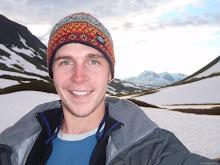 I was back in the Northern province this weekend, in a part of the country called Rulindo district. At dinner Friday night I happened to sit near the mayor of Rulindo district, a very friendly guy, and he came over and started talking to the visitors like a good politician would. I told him I thought his district was beautiful, but he assured me I hadn't seen the most beautiful parts, so he invited me to accompany him and his assistant - whose title is "Coordinator of Good Governance in Rulindo District" - on a scenic tour of the district on Saturday. Of course I agreed.
I was back in the Northern province this weekend, in a part of the country called Rulindo district. At dinner Friday night I happened to sit near the mayor of Rulindo district, a very friendly guy, and he came over and started talking to the visitors like a good politician would. I told him I thought his district was beautiful, but he assured me I hadn't seen the most beautiful parts, so he invited me to accompany him and his assistant - whose title is "Coordinator of Good Governance in Rulindo District" - on a scenic tour of the district on Saturday. Of course I agreed.They kept talking about the terraces. They wanted to show me the terraces. We would turn a corner on a mountain road and see some sort of pretty, orderly, cultivated plot, and I would say ahhhh terraces, and they would say nooooo not yet! and so we kept climbing higher and higher around these bends.
I've always felt Rwanda to be crowded. There are so many people, so many huts, so many footpaths and pedestrians even deep into rural country. But up here - high in the mountains - when we finally found THE terraces, I saw an openness, an emptiness, for the first time here. They were right. It was beautiful. Check out the pictures.

And so we continued from our first panorama on our way to the next, and I saw the group of workers that had been building these thousands of terraces and the roads in the area. A hundred guys at the side of the road with pickaxes and shovels, mostly dusty and grumpy-looking in their blue dungaree jumpsuits. The mayor and posse told me that these guys - these hundred-odd, normalish dudes - had confessed and been convicted of genocide crimes. They had served their few years in jail and now were being put to work as a way to pay back their country.
And turns out our next panorama was right by that work crew. So I got to step out of the pickup and walk through this crowd of killers (and yet normal Rwandan men) who simultaneously stopped working, stood up, leaned on their pickaxes and stared at me.

Because I knew what they had done, I guess I expected them to be like ghost men. Vacant, haunted stares. Angry and wrinkled, oozing hatred - I don't know. But what really surprised me were the ones who smiled and waved and cheerily said "Good afternoon!" or the ones with those goofy, floppy felt caps some men here wear.
They all have probably killed a lot of people. They are also in a lot of ways the average Rwandan man - one of a certain background and age bracket. If it shocks you that these men convicted of genocide are paying their debt to society by building roads with shovels, remember that at one point in the late nineties Rwanda had over 92,000 people awaiting trial for genocide crimes. It is not a stretch to see why they have abolished the death penalty. And why Rwanda has such good roads.

No comments:
Post a Comment